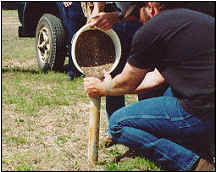 |
 |
To Print Use The pdf File
ILLINOIS URBAN MANUAL
PRACTICE STANDARD
WELL DECOMMISSIONING
(no.)
CODE 996
 (Source: IL Department of Natural Resources) |
DEFINITION
The sealing and permanent closure of a water well, boring, or monitoring well.
PURPOSE
The purposes of this practice are to:
CONDITIONS WHERE PRACTICE APPLIES
This standard applies to sealing and
permanent closure of a water well, boring, or monitoring well that is no longer in use, or is in such a state of disrepair that it has the potential for transmitting contaminants into an aquifer or otherwise threatens the public health or safety.This practice does not apply to wells that were used for waste disposal, or if evidence of contamination in the well exists. This practice does not apply to wells that contain contaminant levels that exceed state or federal water quality standards. Treatment of contamination source(s) is required before a well is decommissioned.
CRITERIA
All planned work shall comply with regulations as set forth in
the Illinois Water Well Construction Code (Section 920.120 - Abandoned
Wells and Section 920.130 - Permit Requirements) and any applicable local law.
CONSIDERATIONS
The decommissioning of water wells, borings, and monitoring wells are regulated by the Illinois Water Well Construction Code and local health department ordinances. If there is any disagreement between this standard and the current state/local codes, the state/local codes have primacy.
This practice may be part of a ground water protection system that includes water and chemical management practices.
To the extent practicable, an abandoned well should be decommissioned in a manner that restores the original hydrogeological conditions of the well site and does not preclude the use of the site from future land management practices.
Decommissioning requires special consideration of specific geological, biological, physical, and climatic conditions, the chemical composition of the surrounding soil, rock, and ground water at the well site, and the well’s construction. The proximity of the abandoned well to other planned or existing wells and the hydrologic conditions of the area should be considered when decommissioning abandoned wells.
PLANS AND SPECIFICATIONS
Plans and specifications for decommissioning abandoned water wells shall be consistent with this standard and shall describe the requirements for applying the practice to achieve its intended purposes.
Minimum documentation of a well decommissioning shall consist of an approved (by Illinois State Department of Health or local health department) plan or permit and a well sealing form (IL 482-0631, or local health department provided form).
OPERATION AND MAINTENANCE
The decommissioned well site shall be maintained in such a manner as to be consistent with adjacent land use(s). If general subsidence of the area overlaying the sealed well occurs, sufficient soil material shall be added to maintain a positive slope away from the abandoned well.
REFERENCE
Illinois Department of Public Health, 1998. Illinois Water Well Construction Code, Section 920.120-Abandoned Wells and Section 920-130-Permit Requirements. Springfield, IL
NRCS IL November 1999